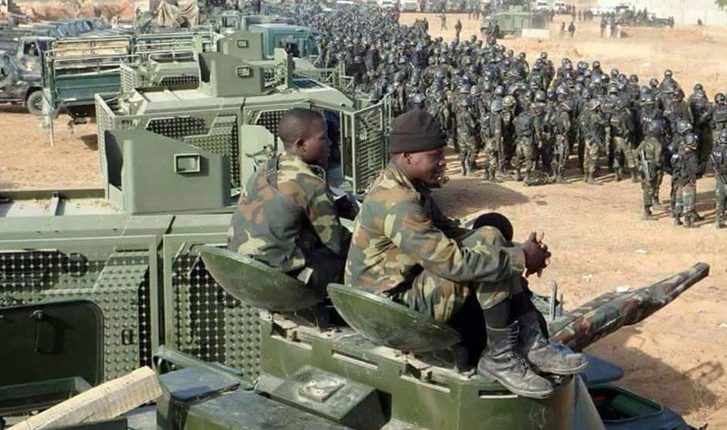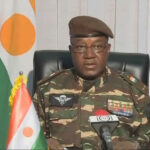
The news having to do with the resolve of the Economic Community of West African States, in its strategic and extra-ordinary summit on the political situation in the Niger Republic, to besiege the neighbouring Niger with a military force has caught me unawares. In fact, I was in the league of the many Nigerians who had the courage to quickly scorch the supposed fake news so it did not fester and become reality. The meeting, which was reportedly convened under the auspices of President Bola Tinubu, was attended by eight leaders of ECOWAS member countries and Foreign Ministers of Liberia and The Gambia.
While Tinubu should be credited for his audacious leadership and fearless disposition in the face of the glaring threat to democracy in the annals of our African history, he should be informed of the limits to his powers, especially as it relates to his romance with the legislature, which has been constitutionally empowered to regulate the executive in delicate and critical periods as we currently are in Nigeria.
There is no gainsaying about the fact that Tinubu is occupying a critical position of responsibility in the comity of African nations. Tinubu’s recognition as the leader of ECOWAS remains a blunt reinstatement of Nigeria as the spirit-machine on the robotic African continent. We must continue to pray he gets the maximum recognition due to Nigeria in the course of his leadership.
However, it must be put straight that Tinubu had the uncommon privilege of becoming the Chairman of ECOWAS by virtue of his position as the President of Nigeria. The position of the Nigerian president is a constitutional position. The occupier of a constitutional position should not conduct himself in a way that tampers with the entire body of laws recognising him as the president. It is also worthy of special note that his loyalty to ECOWAS does not in any way override his loyalty to Nigeria.
I am not shocked at this critical step taken by ECOWAS. I also don’t think Tinubu should be directly or individually responsible for a consensus reached amidst the members of ECOWAS. As the chairman, he could barely mask the responsibilities of a referee in a football match and not a dictator who calls the shots. While anybody would have expected him to preach peace by facilitating a diplomatic resolution of the conflict in Niger, the entire body of the regional bloc or organisation is not under the burden to follow his path, even as the chairman.
Tinubu has attempted to broker peace by initiating several dialogues with the recalcitrant junta in Niger. The desperate junta, which appears to have been shielding its leader, Abdourahmane Tiani, from the reach of several delegations, will not also back down until it has instigated Nigeriens to defend their homeland in a bloody combat. Just yesterday, Nigerien youths were said to have formed a cluster of vigilante groups. This was in a bid to fight any aggression from any of the opposing African countries.
ECOWAS, via its many delegations, has diplomatically engaged Niger; from Patrice Talon of Benin and Mahamat Deby of Chad Republic to the delegation ably led by a former Nigerian Head of State, Abdusalami Abubakar, including Sanusi Lamido. The stubborn military junta has refused to hearken to peace. The Abdusalami Abubakar delegation was reportedly prevented from entering Niamey, the capital of Niger. They were reported to have been locked in a room. This was despite having as part of it a renowned Nigerian monarch, the Sultan of Sokoto. From the foregoing, it is reasonably understood why ECOWAS chose the path of warfare.
But our President and Chairman of ECOWAS cannot physically commit himself to this war. His hands are tied; his tongue is also twisted. Both cannot speak the same language at this critical time. While his tongue can utter a go-ahead, his hands cannot set a squadron in the field of bloody battle. He can only “siddon look.”
He has taken the path of honour by intimating the National Assembly with the development in Niger. He disclosed his intention to commit the Nigerian military to this collective West African battle. He requested “military build-up and deployment of personnel for military intervention to enforce compliance of the military junta in Niger should they remain recalcitrant.”
The Nigerian Senate was set on fire by the controversial request of Tinubu. There was an informed protest from representatives from the states bordering neighbouring Niger, the northern caucus which felt a war against Niger was capable of inviting trouble for their people. The war against Niger has also been predicted by thinkers to be one against Mali, Burkina Faso and other military-controlled countries. The recent visit of President Vladimir Putin of Russia to Burkina Faso has attracted attention. Meanwhile, his favour has been curried by Nigeriens, who gloried on touting his name on the streets.
The Senate invoked its powers under section 5 (4) of the constitution, by expressly resisting the suggested military intervention but diplomatic relations between both countries. The said legislative resolution was communicated to Tinubu.
Section 5(4) of the 1999 Constitution says: “Notwithstanding the foregoing provisions of this section: (a) the President shall not declare a state of war between the federation and another country except with the sanction of a resolution of both Houses of the National Assembly, sitting in a joint session; and (b) except with the prior approval of the Senate, no member of the Armed Forces of the Federation shall be deployed on combat duty outside Nigeria.”
While building upon the foundation of the earlier stated provision, subsection 5 states: “Notwithstanding the provisions of subsection (4) of this section, the President, in consultation with the National Defence Council, may deploy members of the Armed Forces of the Federation on a limited combat duty outside Nigeria if he is satisfied that the national security is under imminent threat or danger: provided that the President shall, within seven days of actual combat engagement, seek the consent of the Senate and the Senate shall thereafter give or refuse the said consent within 14 days.”
In this situation, Nigeria cannot be said to be under any real or imminent threat – one that could warrant the jumping of the gun. A request had been addressed and had been turned down. Tinubu cannot close his eyes to this glaring provision of the constitution which bars him from initiating any intervention in solidarity with ECOWAS. He can merely give his blessings to the declared military combat with the Niger junta. He is also permitted to support the move in his capacity as the President of ECOWAS and not as Nigerian President. A mutiny against any further executive order in this regard is absolutely legal.
Tinubu must always remember that he was elected in a democracy and not as a military administrator. He cannot initiate unconstitutional orders in a constitutional era and creation. The drafters of the constitution are aware that matters of war are beyond what the Commander-in-Chief could think around alone; he is under the burden of brainstorming with the representatives of the people in the legislature. He should not overlook this clause, not even when he has shown himself to be aware of this provision by writing the Senate.
- Akingbondere writes from Lagos





